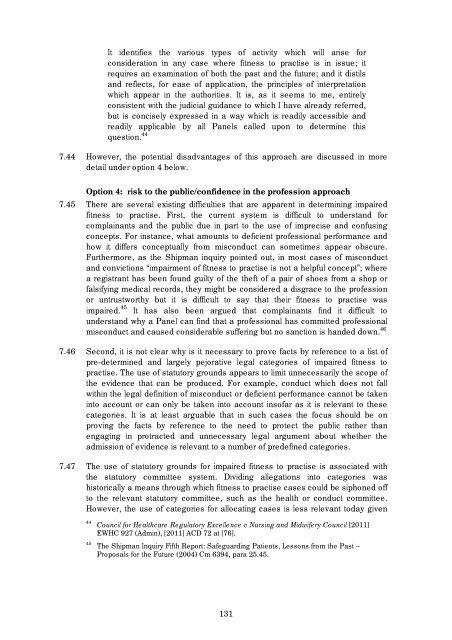Regulation of Health and Social Care Professionals Consultation
Regulation of Health and Social Care Professionals Consultation
Regulation of Health and Social Care Professionals Consultation
Create successful ePaper yourself
Turn your PDF publications into a flip-book with our unique Google optimized e-Paper software.
It identifies the various types <strong>of</strong> activity which will arise for<br />
consideration in any case where fitness to practise is in issue; it<br />
requires an examination <strong>of</strong> both the past <strong>and</strong> the future; <strong>and</strong> it distils<br />
<strong>and</strong> reflects, for ease <strong>of</strong> application, the principles <strong>of</strong> interpretation<br />
which appear in the authorities. It is, as it seems to me, entirely<br />
consistent with the judicial guidance to which I have already referred,<br />
but is concisely expressed in a way which is readily accessible <strong>and</strong><br />
readily applicable by all Panels called upon to determine this<br />
question. 44<br />
7.44 However, the potential disadvantages <strong>of</strong> this approach are discussed in more<br />
detail under option 4 below.<br />
Option 4: risk to the public/confidence in the pr<strong>of</strong>ession approach<br />
7.45 There are several existing difficulties that are apparent in determining impaired<br />
fitness to practise. First, the current system is difficult to underst<strong>and</strong> for<br />
complainants <strong>and</strong> the public due in part to the use <strong>of</strong> imprecise <strong>and</strong> confusing<br />
concepts. For instance, what amounts to deficient pr<strong>of</strong>essional performance <strong>and</strong><br />
how it differs conceptually from misconduct can sometimes appear obscure.<br />
Furthermore, as the Shipman inquiry pointed out, in most cases <strong>of</strong> misconduct<br />
<strong>and</strong> convictions “impairment <strong>of</strong> fitness to practise is not a helpful concept”; where<br />
a registrant has been found guilty <strong>of</strong> the theft <strong>of</strong> a pair <strong>of</strong> shoes from a shop or<br />
falsifying medical records, they might be considered a disgrace to the pr<strong>of</strong>ession<br />
or untrustworthy but it is difficult to say that their fitness to practise was<br />
impaired. 45 It has also been argued that complainants find it difficult to<br />
underst<strong>and</strong> why a Panel can find that a pr<strong>of</strong>essional has committed pr<strong>of</strong>essional<br />
misconduct <strong>and</strong> caused considerable suffering but no sanction is h<strong>and</strong>ed down. 46<br />
7.46 Second, it is not clear why is it necessary to prove facts by reference to a list <strong>of</strong><br />
pre-determined <strong>and</strong> largely pejorative legal categories <strong>of</strong> impaired fitness to<br />
practise. The use <strong>of</strong> statutory grounds appears to limit unnecessarily the scope <strong>of</strong><br />
the evidence that can be produced. For example, conduct which does not fall<br />
within the legal definition <strong>of</strong> misconduct or deficient performance cannot be taken<br />
into account or can only be taken into account ins<strong>of</strong>ar as it is relevant to these<br />
categories. It is at least arguable that in such cases the focus should be on<br />
proving the facts by reference to the need to protect the public rather than<br />
engaging in protracted <strong>and</strong> unnecessary legal argument about whether the<br />
admission <strong>of</strong> evidence is relevant to a number <strong>of</strong> predefined categories.<br />
7.47 The use <strong>of</strong> statutory grounds for impaired fitness to practise is associated with<br />
the statutory committee system. Dividing allegations into categories was<br />
historically a means through which fitness to practise cases could be siphoned <strong>of</strong>f<br />
to the relevant statutory committee, such as the health or conduct committee.<br />
However, the use <strong>of</strong> categories for allocating cases is less relevant today given<br />
44 Council for <strong>Health</strong>care Regulatory Excellence v Nursing <strong>and</strong> Midwifery Council [2011]<br />
EWHC 927 (Admin), [2011] ACD 72 at [76].<br />
45 The Shipman Inquiry Fifth Report: Safeguarding Patients, Lessons from the Past –<br />
Proposals for the Future (2004) Cm 6394, para 25.45.<br />
131
















